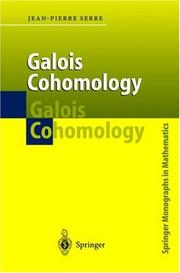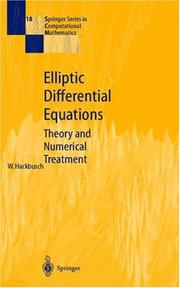| Listing 1 - 5 of 5 |
Sort by
|

ISBN: 3540421920 Year: 2002 Publisher: Berlin ; New York Springer
Abstract | Keywords | Export | Availability | Bookmark
 Loading...
Loading...Choose an application
- Reference Manager
- EndNote
- RefWorks (Direct export to RefWorks)
Algebra, Homological. --- Algebraic number theory. --- Galois theory. --- Algebra, Homological --- Algebraic number theory --- Galois theory --- 512.623.3 --- Equations, Theory of --- Group theory --- Number theory --- Homological algebra --- Algebra, Abstract --- Homology theory --- 512.623.3 General Galois theory --- General Galois theory
Book
ISBN: 9780821898543 Year: 2015 Publisher: Providence (R.I.) : American mathematical society,
Abstract | Keywords | Export | Availability | Bookmark
 Loading...
Loading...Choose an application
- Reference Manager
- EndNote
- RefWorks (Direct export to RefWorks)
Book
ISBN: 1470422239 Year: 2015 Publisher: Providence, Rhode Island : American Mathematical Society,
Abstract | Keywords | Export | Availability | Bookmark
 Loading...
Loading...Choose an application
- Reference Manager
- EndNote
- RefWorks (Direct export to RefWorks)

ISBN: 354054822X 038754822X Year: 1992 Publisher: Berlin Springer
Abstract | Keywords | Export | Availability | Bookmark
 Loading...
Loading...Choose an application
- Reference Manager
- EndNote
- RefWorks (Direct export to RefWorks)
517.95 --- 519.6 --- 681.3 *G18 --- Partial differential equations --- Computational mathematics. Numerical analysis. Computer programming --- Partial differential equations: difference methods; elliptic equations; finite element methods; hyperbolic equations; method of lines; parabolic equations (Numerical analysis) --- Differential equations, Elliptic. --- 681.3 *G18 Partial differential equations: difference methods; elliptic equations; finite element methods; hyperbolic equations; method of lines; parabolic equations (Numerical analysis) --- 519.6 Computational mathematics. Numerical analysis. Computer programming --- 517.95 Partial differential equations --- Differential equations, Elliptic --- Elliptic differential equations --- Elliptic partial differential equations --- Linear elliptic differential equations --- Differential equations, Linear --- Differential equations, Partial
Book

ISBN: 9783642141287 9783642141270 9783642141294 Year: 2010 Publisher: Berlin, Heidelberg Springer Berlin Heidelberg
Abstract | Keywords | Export | Availability | Bookmark
 Loading...
Loading...Choose an application
- Reference Manager
- EndNote
- RefWorks (Direct export to RefWorks)
Thisvolumecontainsthecollectedcontributionsofthreeconferences,AISC2010, Calculemus 2010 and MKM 2010. AISC 2010 was the 10th International C- ference on Arti?cial Intelligence and symbolic computation. Its area of concern is the use of AI techniques within symbolic computation as well as the appli- tion of symbolic computation to AI problem solving. Calculemus 2010 was the 17th Symposium on the Integration of Symbolic Computation and Mechanised Reasoning, dedicated to the combination of computer algebra systems and - tomated deduction systems. MKM 2010 was the 9th International Conference on Mathematical KnowledgeManagement, an emerging interdisciplinary?eld of research in the intersection of mathematics, computer science, library science, andscienti?cpublishing. Allthreeconferencesarethusconcernedwithproviding intelligent computer mathematics. Although the conferences have separate c- munities and separate foci, there is a signi?cant overlap of interest in building systems for intelligent computer mathematics. As in 2008 and 2009,the three events were colocated. In 2010 this was at the Conservatoire National des Arts et M´ etiers (CNAM), Paris, France, under the umbrellaoftheConferencesonIntelligentComputerMathematics(CICM2010), organized by Renaud Rioboo and Laurence Rideau. This collocation is intended to counteract the tendency towards fragmentation of communities working on di?erent aspects of various independent branchesof our general?eld; traditional branches (e. g. , computer algebra, theorem proving and arti?cial intelligence in general), as well as newly emerging ones (on user interfaces, knowledge mana- ment, theory exploration, etc. ). This also facilitates the development of systems for intelligent computer mathematics that will be routinely used by mathema- cians, computer scientists and engineers in their every-day work.
| Listing 1 - 5 of 5 |
Sort by
|

 Search
Search Feedback
Feedback About UniCat
About UniCat  Help
Help News
News